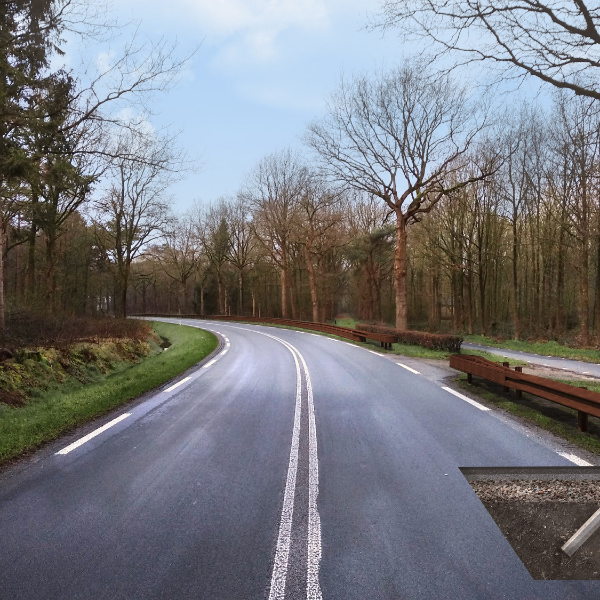Compact Ecorail
Sustainable traffic barrier increases safety on provincial roads

Compact Ecorail
Provincial and municipal roads are the most dangerous roads in the Dutch traffic network. Yet it is precisely along these roads that installing a traffic barrier is not always possible. The available space between the road and nearby trees may be too small or underground cables or pipes may be present. These could be damaged by a foundation pole being placed straight down into the ground – or, in the event of an accident, by the pole cutting through them. Working in collaboration, Witteveen+Bos, BAM Traffic Technology and Saferoad Holland have come up with an ingenious solution to address this problem in the Province of Friesland: the Compact Ecorail. The end result will be considerably safer provincial and municipal roads.
The top part of the traffic barriers consists of weatherproof steel (COR-TEN steel), a strong material that is well suited to rural areas and scores significantly better on sustainability than the most commonly used alternatives, such as hot-dip galvanised steel. As well as a lower amount of CO2 emissions per linear metre, the Compact Ecorail is also cost-effective, in particular due to its construction using existing materials. The design also allows seamless connection with widely used, ‘standard’ traffic barrier installations.
The Ecorail’s foundation is anchored diagonally: instead of being inserted straight down, the pole enters the ground at an angle. Because of the 45-degree angle towards the road surface, the foundation does not come in contact with underground objects and is not obstructed by tree roots. This allows the installation of traffic barriers on the strip where pipes lie. Owing to the special breakaway construction, no damage is caused underground in the event of a collision.
Conservation of trees
Trees are located close to the edges of many provincial and municipal roads, forming a danger to traffic safety. Also, there is sometimes too little space for a traditional traffic barrier. Trees in these zones frequently make a significant contribution to the landscape, which means cutting them down is not an option. The Compact Ecorail can be a good alternative in this case.
The Compact Ecorail has already passed a safety test. In this test, a car travelling at 80 kilometres per hour collided with the barrier at an angle of 20 degrees. The first Ecorails are expected to have been installed by mid-2021. The Ecorail was nominated for the Vernufteling in 2020, the most prestigious prize for engineering projects in the Netherlands.
More information?
